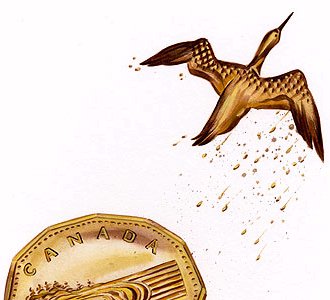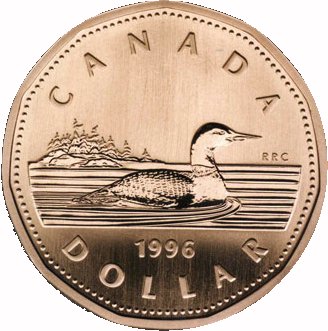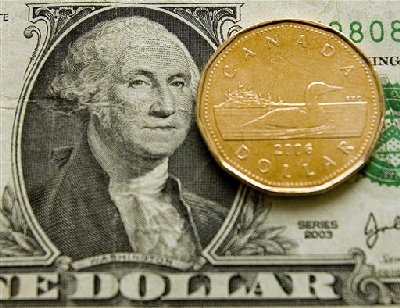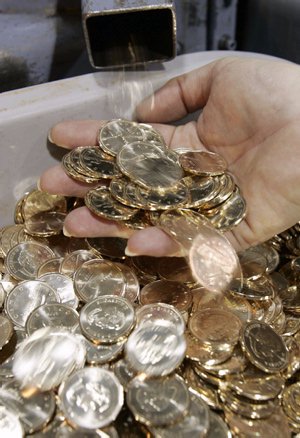| Canadian Dollar Soaring
The Canada eZine - Economics
Is the American Dollar Worthless?By Charles Moffat - November 8th 2007. I am predicting the Canadian dollar will reach $1.20+ US late in 2008. Perhaps sooner. Sounds shocking when you consider the Canadian dollar was worth approx. 64 cents US in 2002. What we have to remember however is that it is not really the Canadian dollar that has gone up in value, it is the American dollar which has gone down. Since the beginning of the Iraq War the American economy has stumbled and one could make the argument that it is because there is no one at the wheel. Remember when President Clinton would travel around the world on trade missions to help sell American products abroad? When was the last time George W. Bush went on a trade mission? The answer is he doesn't. His mission, since 9/11, has been the undying war on terrorism. A war that can never be won and frankly why would they want to win it when the turmoil it causes raises the price of oil and allows oil companies to reap record profits thanks to shortages? Canada's economy meanwhile is stable. Its safe. The fact that we also export oil, gold, wheat and lumber means that our economy is always in high demand. In fact our exports have never been higher. In 2007 our exports to China grew 43%. FOURTY-THREE PERCENT. Our dollar has been totally uneffected in overseas exports. True, our exports to the United States will likely drop as our dollar continues to grow in power, but if the USA doesn't buy our products there are always other countries willing to bid on our oil, gold, wheat and lumber... That is the nature of commodities. People will pay for them regardless. Even if they have to go in debt, which is what has caused the recent problems in the USA. The United States is too dependent on debt. It is a crutch that supports their economy. Credit card debt, car loans, mortgages, business loans, university and college debt. Everyone is up to their necks in it. For housing it is especially common. People need a place to live and nobody wants to rent. The housing shortages are so high that people end up bidding money that they don't have to get their dream home. Its easy to get an $350,000 mortgage on a house worth $300,000, but what happens in 5 years when you need to refinance your mortgage? You'll be fine if the value of your home goes up, but what if it doesn't go up? You can't find a bank that will loan you the money. So whether it is the banks refusing to loan the money or people who are so in debt they can't pay their monthly mortgage payments, the point is Americans have far too much debt. It is a liability and eventually someone has to pay up. So really it is no surprise that the American dollar has slipped in value so much. Too much debt is bound to weigh down a currency and make it practically worthless.
There are other reasons for the US dollar's demise: It is no longer the currency of choice for foreign reserves. The Euro, once derided, is now considered to be the currency of choice. Its stable and strong. The people in Europe have a strong economy and they are not so dependent on gasoline because they also have the world's largest train system, a strong belief in bicycles and are starting to build hydrogen fuel cell cars. In 20 years Europe won't even need gasoline. We can't say the same for North America where we cling hopelessly to the internal combustion engine. The cost of oil has soared 40% in 2007, today nearing almost $100 US/barrel. Also today, the US National Debt officially reached $9 trillion dollars. That is roughly $27,000 US for every man, woman and child which will eventually have to be paid back... in taxes. Which means America will be suffering under more debt and taxes for decades to come. There is no doubt in my mind we will continue to see problems and weakness in the American dollar in 2008.
A Brief History of the American DollarEvery successful empire brings with it an imperial currency. In Roman times, the denarius dominated trade in what is now Europe. At the height of the British Empire, the pound sterling was literally as good as gold. Similarly, when empires wane, so do their currencies. As Rome overextended itself with military adventures they borrowed money to pay for their expenditures, which in turn devalued the denarius. In 1931, depression-torn Britain officially served notice that its empire was on the rocks when it decoupled the British pound from price of gold. Since then, the U.S. dollar has been the world's currency of choice. Arab princes demanded dollars for their oil, as did Colombian cocaine dealers and illegal arms traders in Africa. When China abandoned Communist-Maoism, it was dollars that Communist authorities wanted in exchange for the exports they sent abroad. Yesterday Chinese central banker Xu Jian announced officially what economists have been saying for years: the US dollar is "losing its status as a world currency." China, he explained, would no longer keep only American dollars in its reserves but would diversify its holdings to include other major currencies. Given that China's central bank holds $1.43 trillion worth of U.S. dollars, that was not an insignificant statement. The central bank will slowly be getting rid of that money through financial opportunities, and that in turn will continue to flood the world market with an unseemly amount of American cash. The reasons for the dollar's decline are familiar. Like the Romans and British before them, the Americans have overextended themselves. As a country, they import more than they export. As individuals, they spend more than they earn. As a military, they are fighting more than they can fight. Up to now, these excesses have been balanced by the rest of the world's willingness to hold dollars. China, for instance, was willing to take dollars in exchange for useful manufactured goods because it believed the U.S. currency would hold its value. It is like a giant pyramid scheme when you think about it. As long as everyone believed the dollar was strong, it remained strong. But as soon as a crack appeared, the whole deck of cards starts to crash down. If the American dollar were just America's dollar, none of this might matter. Indeed, a lower U.S. dollar, by boosting American exports, will help the U.S. get through any downturn sparked by that country's housing and mortgage crises. But the U.S. dollar is not just America's... it was basically the world's currency until the Euro appeared. Which means we could be facing a trade war based on fluctuating currencies. As a small trading nation, Canada is sure to be sideswiped in an all-out trade war. Canada depends on a stable international financial system based on a stable international currency, which up until now has been our allies to the south. So forget the minor ups and downs of the loonie. Sure, it matters if the Canadian dollar sits at $1.08 or $0.88, but it matters significantly more if the U.S. dollar itself becomes just plain WORTHLESS.
The EuroNovember 8th 2007. The euro surged to a record high against the U.S. dollar yesterday, touching $1.4731, a 65 per cent gain since the end of 2001. Analysts say the euro has become the main threat to the U.S. dollar's dominance. While political leaders worry its rising value is hurting European exports. The euro made its debut as an accounting currency in 1999 and was put into wide circulation as physical money in 2002. It is the currency of the 13-country euro zone, which includes Austria, Belgium, France, Germany, Greece, Ireland, Italy, Luxembourg, the Netherlands, Portugal, Slovenia, Spain and Finland. In December 2006, the combined value of all euro notes in circulation exceeded that of the U.S. dollar for the first time. French President Nicolas Sarkozy suggested yesterday that currency "disarray" – including a weak U.S. dollar and overvalued Chinese yuan – could lead to "economic war."
|
|
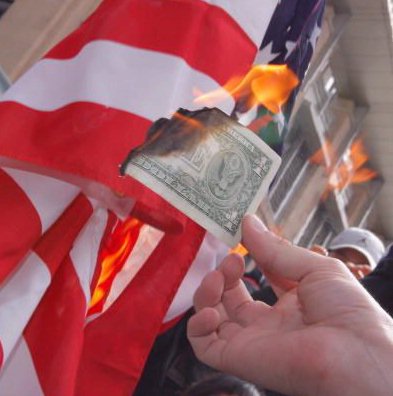
China diversifying foreign reservesThe once-mighty U.S. dollar risks losing its status as the world's default reserve currency now that China has signalled plans to diversify its $1.43 trillion (U.S.) of foreign exchange reserves, analysts say. The U.S. greenback was clobbered on foreign currency markets again yesterday, tumbling against all 16 of the most-active currencies and setting new lows against the euro and the Canadian dollar during the session. At the close of trading, the U.S. dollar was worth 92.81 cents (Canadian). The loonie, meanwhile, suffered a late-day setback, losing 0.77 of a cent (U.S.) to close at $1.0775 as traders took profits. Currency turmoil seeped into other markets as stocks fell on both sides of the border. Toronto's S&P/TSX composite index lost 252.38 to 14.118.18, while the Dow industrials fell 360.92 to 13,300.02. The massive U.S. dollar sell-off was sparked by comments overnight by two Chinese officials suggesting the greenback is losing its global pre-eminence. China is the world's largest holder of U.S. dollar reserves. It also holds roughly 25 per cent of the world's foreign currency reserves, most of it in U.S. dollars. Cheng Siwei, vice-chair of China's National People's Congress, said at a conference in Beijing: "We will favour stronger currencies over weaker ones, and will readjust accordingly." Xu Jian, a vice-director of the central bank who was attending the same gathering, suggested the U.S. dollar is "losing its status as the world currency" and suggested the "world's currency structure has changed." Chinese investors have reduced their holdings of U.S. Treasuries by 5 per cent to $400 billion in the five months to August. China Investment Corp., which manages the country's $200 billion sovereign wealth fund, said last month it may get more of the country's reserves to invest to improve returns. A country typically holds stockpiles of cash in international currencies to support its own currency and exchange rate, and to backstop its liabilities, and as investments. The U.S. dollar has been an international medium of exchange for the last 60 years, said Maurice Levi, professor of international finance at the Sauder School of Business at the University of British Columbia. "Now you've got a serious alternative to that, which is to hold euros. This is a sea of change in the structure of the global system if we do move away from dollars," Levi said. "It's inevitable in a sense. I tell my students that the 18th century was the age of gold, the 19th century was the age of the (British pound) sterling, the 20th century was the age of the dollar and the 21st century is up for grabs, and could easily be the euros."
| |
